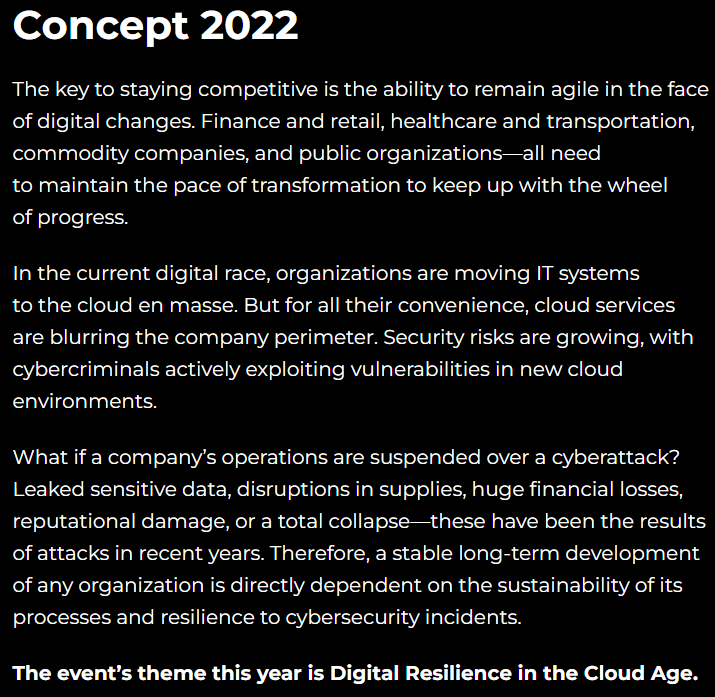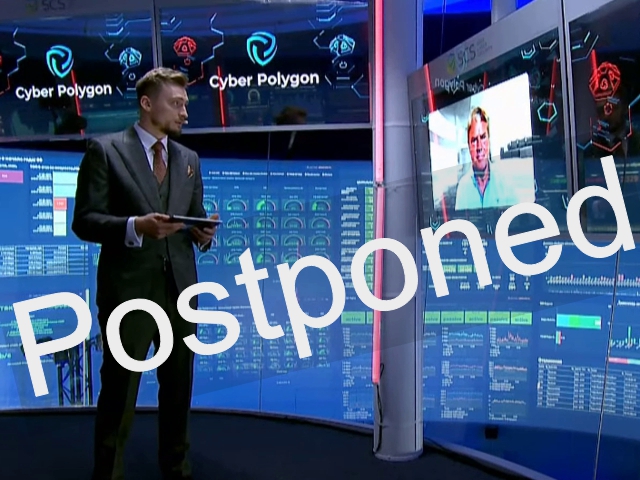The Russian-based, WEF-backed annual cybersecurity exercise Cyber Polygon is postponed, according to the event host, BI.ZONE.
Scheduled to take place on July 8, Cyber Polygon 2022 was officially postponed on Wednesday, and a new date has not yet been set.
“In earnest anticipation of Cyber Polygon (July 8, 2022), we regret to bring you the news that we are postponing the event. There is no information available as to the new date, but we will let you know once we have it” — BI.ZONE, Cyber Polygon host and subsidiary of Russia’s largest bank, Sberbank
The announcement was made by the event’s host, Russian digital security company BI.ZONE, on the Cyber Polygon website on May 25.
No official reason was given for the postponement, and there was no mention of sanctions or Ukraine.
“In earnest anticipation of Cyber Polygon (July 8, 2022), we regret to bring you the news that we are postponing the event. There is no information available as to the new date, but we will let you know once we have it,” a BI.ZONE newsletter from May 26 reads.
While this year’s event has been postponed, the central theme for Cyber Polygon 2022 remains listed on the website as “Digital Resilience in the Cloud Age.”
However, the “2022 Concept” section in the Cyber Polygon About page was recently deleted, which suggests that the central theme may or may not be reconsidered.
Published in February, the Cyber Polygon 2022 Concept can still be found on the Wayback Machine, and you may find a screen shot below.

Headquartered in Moscow, BI.ZONE has been a subsidiary of Sberbank of Russia since 2016, and it was established to “to detect cyber threats and intrusion attempts, as well as to carry out security system audits for the largest bank in Russia.”
Launched in 2019, Cyber Polygon is an annual cybersecurity training exercise put on by BI.ZONE, in collaboration with the World Economic Forum (WEF) and Interpol.
Last year, the training gathered 200 teams from 48 countries while the online conference attracted more than 7 million viewers from 78 countries, according to the organizers.
“A lack of cybersecurity has become a clear and immediate danger to our society worldwide” — Klaus Schwab, Cyber Polygon 2021
“We need vaccines to immunize ourselves. The same is true for cyberattacks” — Klaus Schwab, Cyber Polygon 2021
Cyber Polygon 2021 simulated “a targeted supply chain attack on a corporate ecosystem in real time.”
In his opening remarks at Cyber Polygon 2021, WEF Founder Klaus Schwab warned, “A lack of cybersecurity has become a clear and immediate danger to our society worldwide.”
The unelected globalist went on to explain in July, 2021, “We need vaccines to immunize ourselves. The same is true for cyberattacks.
“Here, too, we have to move from simple protection to immunization. We need to build IT infrastructures that have digital antibodies built-in inherently to protect themselves.”
Discussions coming out of Cyber Polygon 2021 concluded with a desire to immunize the internet, demonize cryptocurrencies, and prop-up centralized systems of governance through a closer merger of corporations and states (public-private partnerships).
“We all know, but still pay insufficient attention to, the frightening scenario of a comprehensive cyber attack, which would bring a complete halt to the power supply, transportation, hospital services, our society as a whole” — Klaus Schwab, Cyber Polygon 2020
“The COVID-19 crisis would be seen […] as a small disturbance in comparison to a major cyber attack” — Klaus Schwab, Cyber Polygon 2020
A year prior, at Cyber Polygon 2020, Schwab had warned of a coming cyber pandemic that would shock society to its core.
“We all know, but still pay insufficient attention to, the frightening scenario of a comprehensive cyber attack, which would bring a complete halt to the power supply, transportation, hospital services, our society as a whole,” said Schwab.
“The COVID-19 crisis would be seen in this respect as a small disturbance in comparison to a major cyber attack,” he added.
Cyber Polygon 2020 operated under the theme: “digital pandemic: how to prevent a crisis and to reinforce cybersecurity on all levels.”
“A cyber attack with COVID-like characteristics would spread faster and farther than any biological virus” — World Economic Forum, 2021
According to the WEF, COVID-19 was known as an anticipated risk, and so is its digital equivalent.
What’s more, “A cyber attack with COVID-like characteristics would spread faster and farther than any biological virus. Its reproductive rate would be around 10 times greater than what we’ve experienced with the coronavirus.”
A few months before the COVID-19 coronavirus outbreak, the WEF, along with the Johns Hopkins and the Bill and Melinda Gates Foundation, held a fake pandemic exercise on October 18, 2019 called Event 201, which specifically simulated a coronavirus pandemic to gauge global preparedness.
Many scenarios coming out of Event 201 became reality in 2020 and beyond including government lockdowns, social media censorship, global economic crashes, and societal upheaval — all ingredients being necessary to usher in a great reset.












